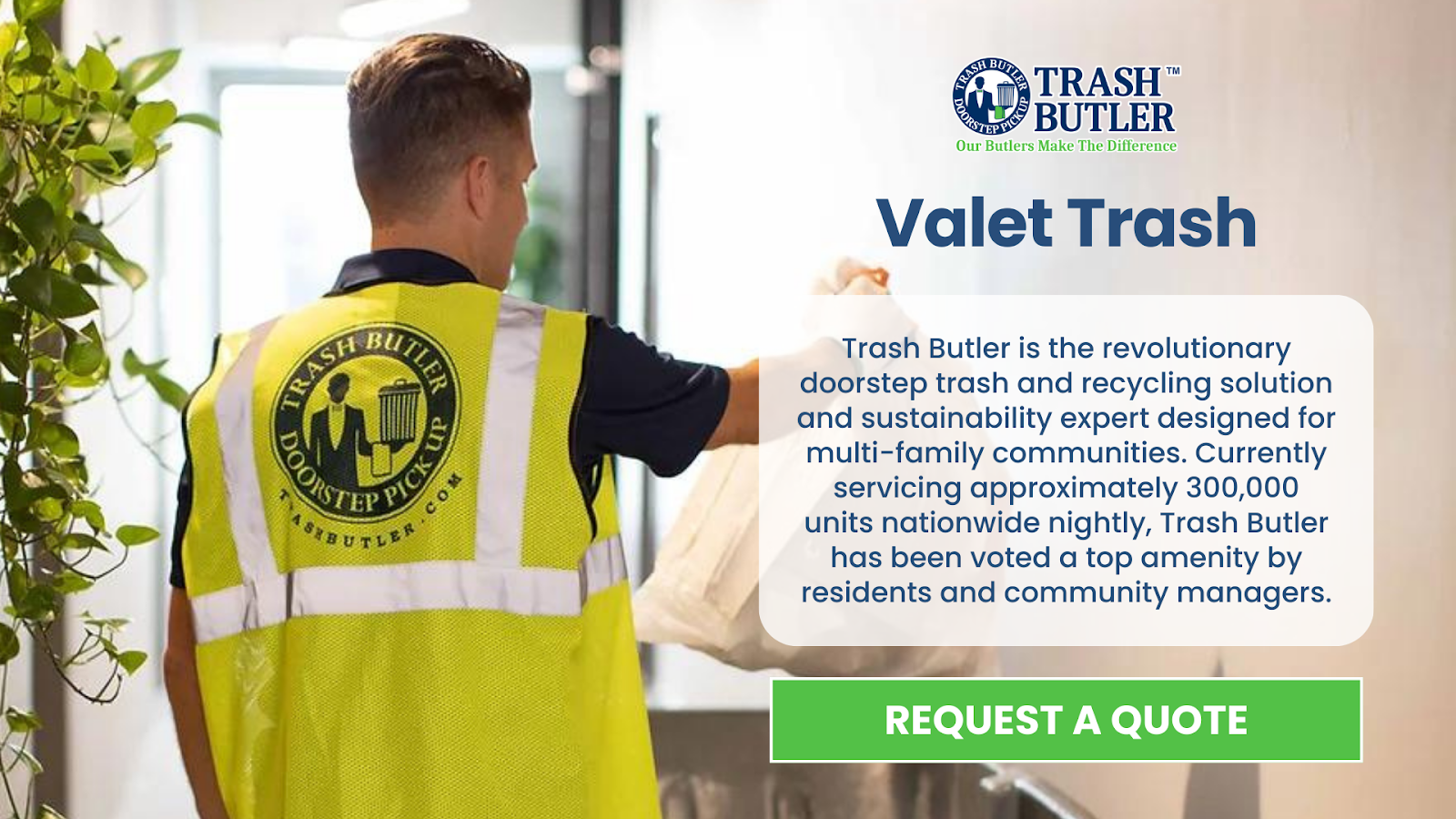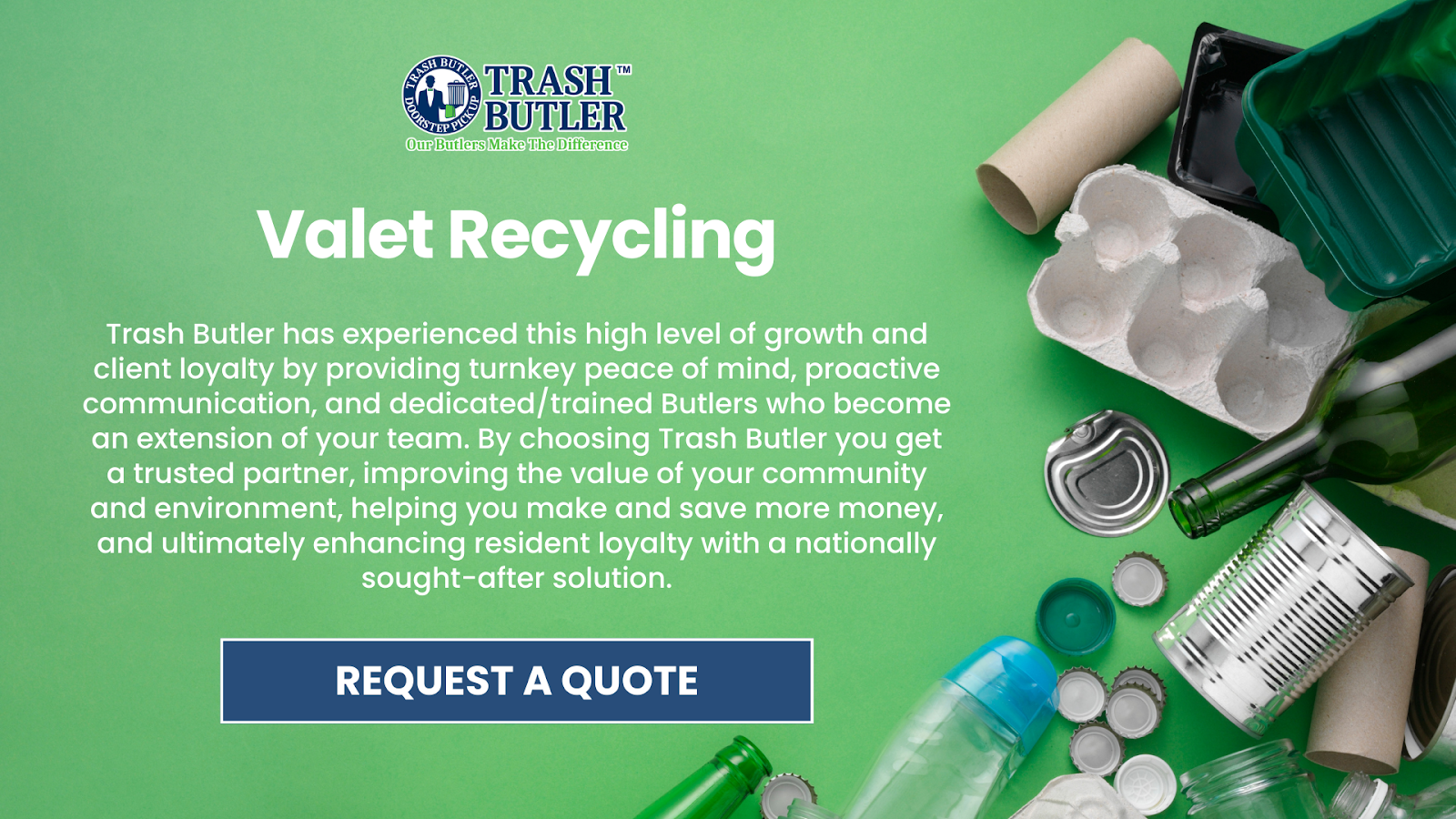Key Takeaways:
- Seasonal Waste Fluctuations: Seasonal waste trends require property managers to anticipate and adapt to significant waste volume and composition fluctuations throughout the year.
- Promoting Sustainability Through Waste Management: Effective communication, resident education, and leveraging local recycling programs are crucial in promoting sustainability and enhancing waste management efficiency.
- Streamline Waste Efficiency: Partnering with professional waste management services like Trash Butler™ can streamline handling seasonal waste variations, ensuring compliance and operational efficiency.
Ever noticed how waste piles up faster during certain times of the year? From overflowing bins during the holidays to heaps of yard debris in the fall, seasonal changes bring unique challenges for property managers. Without proper preparation, these fluctuations can lead to overflowing dumpsters, pest issues, and tenant complaints—all of which can harm your property’s reputation and efficiency.
In this article, we’ll explore the common challenges of seasonal waste, why proactive planning is essential, and actionable tips to help you create a year-round waste management strategy that keeps your property running smoothly.
Why Seasonal Waste Management Requires A Strategic Approach
Seasonal waste management presents a unique set of challenges and opportunities for property managers of multi-family apartment communities. Unlike regular waste, which maintains a consistent volume and composition, seasonal waste can vary significantly throughout the year.
This variation requires a strategic approach to ensure efficient management, resident satisfaction, and environmental sustainability. Here are key reasons why adopting a strategic seasonal waste management approach is crucial:
Volume Fluctuations
Seasonal events, holidays, and changing weather conditions can lead to substantial fluctuations in waste volume. For example, during the holiday season, properties may experience increased packaging waste from online shopping, gift wrapping, and decorations. A strategic approach involves anticipating these fluctuations and adjusting service frequency and capacity accordingly.
Composition Changes
The type of waste generated can also change with the seasons. Spring might increase yard waste, while the end of the school year could see a surge in furniture and electronic waste as residents move out. Understanding these trends allows property managers to arrange for the appropriate recycling and disposal solutions, minimizing environmental impact.
Resident Participation and Satisfaction
Effective seasonal waste management strategies can significantly impact resident satisfaction. Clear communication about waste disposal and recycling processes—especially during high-waste seasons—can enhance residents’ participation in sustainability initiatives. This not only improves waste management efficiency but also aligns with the values of environmentally conscious residents.
Regulatory Compliance
Waste management regulations can vary by season, especially for yard and hazardous waste. Staying ahead of these variations is necessary to ensure compliance and avoid potential fines. A strategic approach includes keeping up with local waste management regulations and educating staff and residents on proper disposal practices.
Operational Efficiency and Cost Savings
A well-planned seasonal waste management strategy can lead to significant operational efficiencies and cost savings. By adjusting waste pickup schedules, deploying additional resources during peak times, and promoting recycling and waste reduction, properties can reduce waste management costs while maintaining a clean and attractive environment for residents.
Common Seasonal Waste Challenges For Property Managers
Understanding and preparing for seasonal waste trends is crucial for property managers of multi-family apartment communities. Each season brings waste management challenges, and staying ahead can significantly improve sustainability, operational efficiency, and resident satisfaction. Here are common seasonal waste challenges that property managers face:
Holiday Seasons: Increased Volume And Varied Waste Types
The holiday season typically brings a substantial increase in waste volume. Decorations, gift wrappings, boxes, and the disposal of natural trees can overwhelm standard waste management systems. Furthermore, various materials, including non-recyclable and recyclable items, require careful sorting and disposal to avoid contamination and increase recycling rates.
Summer: Outdoor Activities And Bulk Waste
The summer months see an uptick in outdoor activities, leading to more frequent use of communal spaces and, consequently, an increase in waste generation. Barbecues, pool parties, and other gatherings can generate large amounts of waste, including food waste, disposable plates, cups, and cutlery. Additionally, summer is often when residents move in or out, resulting in higher volumes of bulk waste such as furniture and electronics.
Fall: Leaves And Organic Debris
Fall presents a unique challenge with the accumulation of leaves and organic debris. This poses a problem not only in keeping outdoor areas clean and safe but also in managing this type of waste, which requires different handling and disposal methods compared to regular household waste. Improper management can lead to blocked drainage systems and unsightly property grounds.
Winter: Holiday Décor Disposal And Weather-Related Challenges
Post-holiday decor disposal is a significant challenge in winter, along with the complications of colder weather. Snow and ice can hamper waste collection efforts, leading to delays and waste accumulation. Furthermore, the cold may affect the functionality of waste compactors and other equipment, disrupting the efficiency of waste management operations.
How To Anticipate Waste Volume Changes Throughout The Year
Anticipating waste volume changes is crucial for maintaining a clean and sustainable environment in multi-family apartment communities. Property managers can ensure efficient waste management throughout the year by understanding the seasonal trends and planning accordingly. Here are key strategies to help property managers prepare for fluctuating waste volumes:
Analyze Past Waste Data
Historical data is invaluable in predicting future waste generation trends. Review the waste collection data from previous years to identify patterns or seasons with increased waste generation. This could include holiday periods, summer months when residents might clean out their homes, or move-in and move-out peaks at the beginning and end of school terms.
Stay Informed About Local Events
Local events can significantly impact waste volumes, especially in communities close to event venues or in cities with frequent festivals. Property managers should stay abreast of local calendars and plan additional waste management measures during these times.
Engage With Residents
Communication with residents about waste management is vital. Informing them about the correct disposal and recycling practices can help reduce improper waste disposal. Season-specific waste management tips can guide residents on how to minimize their waste footprint during high-waste periods.
Implement A Flexible Waste Management Plan
A one-size-fits-all approach does not work with waste management, especially when dealing with the nuances of seasonal changes. A flexible plan that can be adjusted based on anticipated waste volume increases will ensure that properties are always manageable. This could mean scheduling additional collections during peak periods or providing extra recycling bins for periods when recyclable waste is expected to increase.
Collaborate With A Professional Waste Management Service
Partnering with a professional waste management service like Trash Butler™ can significantly ease the burden of anticipating and managing seasonal waste trends. With our expertise in sustainability and revolutionary doorstep valet trash and recycling solutions, Trash Butler™ is equipped to handle the complexities of seasonal waste management.
Effective Communication Strategies To Educate Tenants About Waste Disposal
Implementing strategic communication can significantly enhance the efficacy of your waste management plan. Here are several strategies to effectively communicate and educate tenants about waste disposal:
Utilize Multiple Communication Channels
Leverage a variety of communication channels to ensure your message reaches all tenants. This could include email newsletters, social media posts, community bulletin boards, and SMS alerts. By diversifying the mediums through which information is disseminated, property managers can cater to the preferences of different demographics within the community, ensuring that the message of responsible waste disposal is universally received.
Create Informative And Engaging Content
Develop informative and engaging content to capture the attention of your tenants. This could include infographics on sorting waste, videos demonstrating proper disposal techniques, or simple yet compelling flyers highlighting mindful waste disposal’s environmental impact. Remember, content that resonates emotionally or provides a clear, easy-to-follow guideline is more likely to inspire positive action.
Host Educational Events
Organize events such as workshops or seminars focusing on sustainability and effective waste management practices. Inviting experts, such as representatives from Trash Butler™, to speak on the importance of recycling and proper trash disposal can provide tenants with valuable insights and practical knowledge. These events offer a direct platform for interaction, allowing tenants to ask questions and clarify doubts regarding waste disposal guidelines.
Offer Incentives For Compliance
Incentivizing tenants to adhere to waste disposal rules can be a powerful motivator. Initiatives such as recognition programs, small rewards for households exhibiting exemplary waste management practices, or competitions among blocks or buildings to achieve the highest recycling rates can foster a community-wide culture of sustainability.
Establish A Clear And Consistent Message
Consistency in messaging is key to reinforcing the importance of proper waste disposal practices. Ensure that all communications from property management carry a uniform message regarding waste management policies, procedures, and the community’s environmental ethos. This clarity helps establish and maintain high waste disposal standards within the community.
Continuous Feedback And Adjustments
Encourage feedback from tenants about the waste disposal system in place. Open channels for suggestions and complaints can help property managers identify areas for improvement. Actively engaging with tenants and considering their feedback shows a commitment to enforcing rules and ensuring that the system works for everyone.
Leveraging Local Recycling Programs To Reduce Seasonal Waste
Property managers of multi-family apartment communities face unique challenges in managing seasonal waste. One effective strategy for addressing these challenges is leveraging local recycling programs. This approach not only aids in managing seasonal waste fluctuations but also aligns with sustainability practices.
Understanding The Impact Of Seasonal Waste
Seasonal waste trends significantly affect multi-family communities. Holidays and seasonal events often result in an increased volume of waste, including packaging, disposables, and decorations, which can overwhelm traditional waste management systems. Recognizing these trends is the first step in mitigating their impact.
The Role Of Local Recycling Programs
Local recycling programs provide an invaluable resource for managing seasonal waste efficiently. Often run or supported by municipal governments, these programs accept a wide range of recyclable materials. By familiarizing themselves with the specifics of these programs, property managers can significantly reduce the volume of waste sent to landfills.
Practical Tips For Property Managers
- Educate Residents: One key role of property managers is to educate residents about the availability and importance of local recycling programs. This may involve distributing informative materials, hosting informational sessions, or incorporating recycling guidelines into community newsletters.
- Provide Accessible Recycling Options: Ensuring that recycling facilities are accessible to all residents encourages participation. This could mean placing recycling bins in convenient locations throughout the property.
- Coordinate with Local Services: Building relationships with local recycling centers can lead to more efficient services. This might include arranging for special pickups after major seasonal events or securing dedicated bins for specific types of seasonal waste, such as Christmas trees or electronic waste after the holiday.
- Promote Recycling as a Community Value: Embedding recycling and sustainability into the community’s culture makes participation more likely. Highlighting recycling efforts and successes can foster a sense of pride and communal responsibility among residents.
- Leverage Technology and Innovation: Innovative solutions like Trash Butler™ can streamline the recycling process. As a valet trash and recycling service, Trash Butler™ offers a convenient solution that aligns with apartment dwellers’ busy lifestyles, ensuring that recycling doesn’t become a chore.
The Benefits Beyond Waste Reduction
Leveraging local recycling programs goes beyond reducing the volume of seasonal waste. It positions the property as a sustainability leader within the community, enhancing its attractiveness to potential residents who value environmental responsibility. Furthermore, it can reduce waste management costs and create a cleaner, more attractive living environment.
Building A Year-Round Plan For Sustainable Waste Management
A year-round sustainable waste management plan is essential for property managers to address seasonal waste trends effectively, minimize environmental impact, and enhance tenant satisfaction. Such a plan provides a proactive framework for handling fluctuations in waste volume and composition throughout the year, ensuring smooth operations and a cleaner, more sustainable property.
Analyze Historical Waste Data
Start by reviewing past waste collection data to identify trends:
- Volume Fluctuations: Pinpoint times of the year when waste volumes peak (e.g., holidays, moving seasons, or landscaping periods).
- Composition Shifts: Assess changes in waste types, such as organic debris in spring or packaging waste during winter holidays.
This data serves as the foundation for forecasting and planning.
Set Goals For Sustainability
Define clear, measurable objectives, such as:
- Reducing landfill contributions by a specific percentage.
- Increasing recycling rates.
- Minimizing bulk waste during high-demand periods.
Align these goals with broader sustainability initiatives within the community or company.
Develop Seasonal Action Plans
Create tailored strategies for each season:
- Spring:
- Focus on yard waste collection and composting initiatives.
- Educate tenants about the proper disposal of gardening materials.
- Summer:
- Address increased waste from events like barbecues and pool parties.
- Offer guidelines for sorting recyclables and managing food waste.
- Fall:
- Organize leaf and organic debris collection.
- Promote composting or mulching programs.
- Winter:
- Plan for holiday-related waste surges, such as packaging, decorations, and discarded trees.
- Schedule extra bulk waste pickups for post-holiday cleanups.
Educate Tenants Year-Round
Ongoing education ensures tenants are engaged and informed:
- Monthly Newsletters: Share tips on seasonal waste trends and best practices.
- Workshops or Events: Host community recycling drives or composting tutorials.
- Digital Communication: Use apps or online platforms to send reminders about waste schedules and recycling rules.
Optimize Waste Management Infrastructure
- Dumpster Placement and Sizing: Adjust bin sizes and locations to accommodate seasonal waste patterns.
- Signage: Use clear, multilingual signs to help tenants properly sort and dispose of waste.
- Recycling Stations: Provide accessible recycling options, including bins for electronics, batteries, and hazardous materials.
Collaborate With Waste Disposal Providers
Work with local waste management companies to:
- Schedule additional pickups during peak waste periods.
- Arrange for specialized services, such as tree recycling or hazardous waste disposal.
- Gain insights into regional recycling regulations and programs.
Final Thoughts
Seasonal waste trends present unique challenges for property managers in multi-family apartment communities. However, implementing strategic seasonal waste management tips and planning can transform these challenges into opportunities for improved efficiency and sustainability. Emphasizing the importance of community education, proactive scheduling, and specialized waste reduction initiatives will streamline waste management processes, enhance tenant satisfaction, and contribute to a greener environment.
At Trash Butler™, we understand the complexities of managing seasonal waste trends and are dedicated to providing innovative solutions tailored to multi-family apartment communities’ needs. Our doorstep valet trash service and recycling solutions are designed to adapt to seasonal fluctuations, ensuring that your property remains clean, green, and efficient throughout the year.
Request a Quote: Fill out a form to see how Trash Butler™ can benefit your community.
Schedule a Consultation: Contact us to discuss custom solutions for your community’s needs.
Read also:
- Sustainable Practices For Multifamily Property Managers
- Why Tenant Retention Matters: Key Tips For Keeping Tenants Happy
- Is Your Apartment In Need Of A Valet Trash Service? Here’s How To Find One
Frequently Asked Questions About Seasonal Waste Management Tips
What are some common types of seasonal waste?
Seasonal waste typically varies depending on the time of year and upcoming holidays or events. Common types include increased packaging from online shopping during the holiday season, yard waste during fall and spring clean-ups, and food waste from holiday meals and gatherings. Decorations, especially after major holidays like Christmas, Halloween, and Easter, also contribute significantly to seasonal waste volumes.
Why is it important to prepare for increased waste during holidays or events?
Preparing for increased waste during holidays or events is crucial to maintaining property cleanliness, tenant satisfaction, and operational efficiency. These periods often see spikes in waste production from packaging, decorations, food scraps, and bulk items, which can quickly overwhelm regular waste management systems. This can lead to overflowing dumpsters, unpleasant odors, pest issues, and higher cleanup costs without proper preparation.
How can property managers encourage residents to reduce waste during peak seasons?
Property managers can encourage residents by implementing recycling programs, providing waste reduction tips, and organizing donation drives for unwanted items. Educating residents about minimizing waste and offering convenient recycling and composting options can significantly impact waste reduction efforts. Hosting community events focused on sustainability practices also fosters a culture of environmental responsibility among residents.
What role do waste audits play in preparing for seasonal waste trends?
Waste audits play a vital role in understanding the composition and volume of waste generated within a community. By analyzing waste trends, property managers can identify areas where waste reduction efforts can be targeted. Audits provide insight into the effectiveness of current waste management practices and highlight opportunities for improvement, allowing for the development of tailored strategies that address seasonal fluctuations.
How can technology be used to manage and monitor seasonal waste levels?
Technology can be a powerful tool in managing and monitoring seasonal waste levels. Innovative waste management solutions like data analytics and IoT (Internet of Things) devices can help track waste generation patterns and volumes. These technologies enable property managers to optimize waste collection schedules, identify areas for waste diversion, and communicate effectively with residents about waste management practices.
What are the environmental impacts of not managing seasonal waste properly?
Failure to manage seasonal waste properly can lead to several environmental impacts. It can increase landfill waste, contributing to soil and water pollution. Improper disposal of materials, especially hazardous waste, can harm wildlife and ecosystems. Additionally, increased waste production without adequate recycling or composting efforts leads to higher greenhouse gas emissions, exacerbating climate change.






